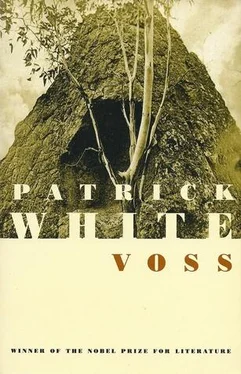Mrs Bonner, on the balcony, sensing her own limitations, tweaked the ribbon through the starched cap, and went inside.
‘They have not yet heard from that German,’ said Rose Portion, whose habit it was to state facts, rather than commit a possible indiscretion by asking.
‘Not yet,’ Laura Trevelyan replied.
She had bared her teeth, it seemed, somewhat convulsively — it could have been the violent glare — and the tips of her teeth were quite transparent.
‘Not yet,’ she said, and mumbled: ‘But perhaps we shall hear, perhaps this evening.’
Although it was spoken more slowly than she had intended, in her mind it sprang like a shiver. Her mouth was dry.
‘Ah, I cannot understand that man,’ said Rose.
‘How?’ asked Laura. ‘Not understand?’
‘It is his speech, I suppose. Though half the time I think he does not understand himself, even in his own language.’
Laura did not answer, but was listening to breath, footsteps, pauses, and pauses were the loudest.
‘No more can I understand his eyes,’ breathed Rose. ‘You should understand a man by his eyes, if by no other avenue.’
Then she cleared her throat, because she had said too much.
They were entering the house by way of the conservatory, in which little ferns rang with bells of moisture, and the teeth of the palm were sawing at the spider’s silk. Here the heat was so intense that the women’s breath was taken from them. Their faces were barely swimming forward between the walls of watery glass. Their features clove painfully the green gloom on which hairy branches swayed.
‘I can understand him,’ said Laura, ‘if not with my reason.’
She was drugged.
‘Even when I cannot agree with him, I can understand him.’
The other woman drew her breath with difficulty.
As they passed into the house, the girl put her hands to her temples in an ecstasy of coolness. When she could not understand, she would pray for him, though of recent nights happiness had made her dumb, and prayer grows, rather, out of wretchedness.
The same evening, when Mr Bonner returned early, as was his habit now, into the house of roses, it happened that his niece was first to meet him, as she passed through the hall on some errand to the pantry. After kissing her at the required moment, for in matters of affection the merchant was something of a ritualist, he did remark:
‘News has come at last from the expedition, today, by the Newcastle packet. They are arrived at Sanderson’s. Or were at his place. They will have left by now for the Downs.
‘So that is that,’ he added, disparagingly, or so it sounded.
The truth was: anything that intruded on the daily round, even events anticipated, or news long hoped for, embittered Mr Bonner.
‘And all is well?’ Laura asked.
‘All are in good heart,’ corrected her uncle. ‘Though it is early days yet, to be sure. Living off the fat of the land.’
How glad he was to be in his own home, and there was no prospect of his having to suffer.
The feet of the young woman were passing on the stone floor of the hall. They made a cool, impersonal sound.
‘Oh, and Laura, there is a letter that has come with mine. It is in the same hand, of Mr Voss. You had better have it.’
‘A letter,’ she repeated, but without surprise, and took it before going on her way.
When she had done what she had intended, Laura Trevelyan went straight up to her room, which, although open to her aunt and her cousin, already contained so much of her secret life, she was not afraid of adding to it. So, after she had sat down and broken the lumpy seal, she unfolded the paper, and began to read rapidly.
That evening, over dessert, when they were discussing the news that had been received, Mrs Bonner asked:
‘Would you say, from his letter, that Mr Voss appears satisfied at last with the way his affairs are progressing?’
Mrs Bonner would almost dare a person to be dissatisfied, provided it was not herself.
‘Yes,’ said her husband, as though he were intending no. ‘I gather he is displeased at the inclusion of Judd, more than ever now that he has met him and can find no reason for objecting.’
‘What sort of a man is Judd?’ asked Mrs Bonner.
‘A very quiet, a very reasonable man, I gather from Sanderson. And lion-hearted. Of great courage and physical strength.’
‘Then, it is the lion in him that Mr Voss is objecting to,’ said Belle, who was bored at this, and would become a silly little girl for her own entertainment.
Her hands, that she held above the finger-bowl, dripped inelegantly with the juice of early peaches.
‘For perhaps the lion will gobble him up,’ she giggled. ‘But, poor lion, I could wish him better than bones and black hair.’
‘Belle!’ Her mother frowned.
And a girl, almost married, who could not learn to eat a peach!
Mr Bonner moved his mouth as if he had a peachstone in it.
‘That could be,’ he said, approving, and would himself have spread a net to assist the lion. ‘But what impression,’ he continued, ‘did Laura’s letter give?’
‘Laura’s letter?’ asked Mrs Bonner and Belle.
‘Yes,’ said the merchant. ‘Mr Voss was kind enough to write to Laura by the same packet. Did you not share the news, Laura?’
The young woman moved her plate slightly, on which were the downy skins of peaches, almost bloody in that light.
‘Yes, I did receive a letter,’ she answered. ‘It was just a short note. Written in friendship. It contains civilities rather than positive news. It did not occur to me to share anything of so little general interest.’
To Mrs Bonner it was peculiar.
To Belle it was something into which animal instinct would burrow at leisure.
But Mr Bonner thought that he detected in his niece signs of unusual dismay, and wondered whether he ought to hurt her, both for her own, and the common safety. Besides acting as a corrective, domestic cruelty could be a mild and pleasing form of sport.
Immediately after this, they pushed back their chairs and went into another room.
And the days swelled with that sensuous beauty which was already inherent in them. I did, of course, know, Laura Trevelyan decided, but remained nevertheless bewildered. By the heavy heads of roses that stunned the intruder beneath trellises. By the scent of ripe peaches, throbbing in long leaves, and falling; they were too heavy, too ripe. Feet treading through the wiry grass were trampling flesh, it seemed, but exquisitely complaisant, perfumed with peach.
Or she closed her eyes, and they rode northward together between the small hills, some green and soft, with the feathers of young corn ruffled on their sides, others hard and blue as sapphires. As the two visionaries rode, their teeth were shining and flashing, for their faces, anonymous with love, were turned, naturally, towards each other, and they did, from time to time, catch such irrelevantly personal glimpses. What they were saying had not yet been translated out of the air, the rustling of corn, and the resilient cries of birds. As they rode on, all metal was twining together, of stirrup-irons, for instance, and the bits in the mouths of their horses. Leather was not the least potent of the scents of their journey, and at evening the head would sink down into the pillow of the warm, wet saddle. The hands of the blind had polished the pommels to the silkiness of ivory.
This was a period of great happiness for Laura Trevelyan, her only known happiness, it seemed. Of course, the other side of her eyelids, there were many possibilities waiting to harm her. If she would open. But she did not.
Except to write. She realized that she had not written the letter.
She sat down one afternoon at her desk. The shutters were closed. Even here was the season’s prevailing scent, of live roses, and the rustling ones, and cloves. She began to write. It was easier than she had expected, as if she had acquired virtuosity in an art. So the chips of marble mounted, as the words were carved out, deep, and final.
Читать дальше












